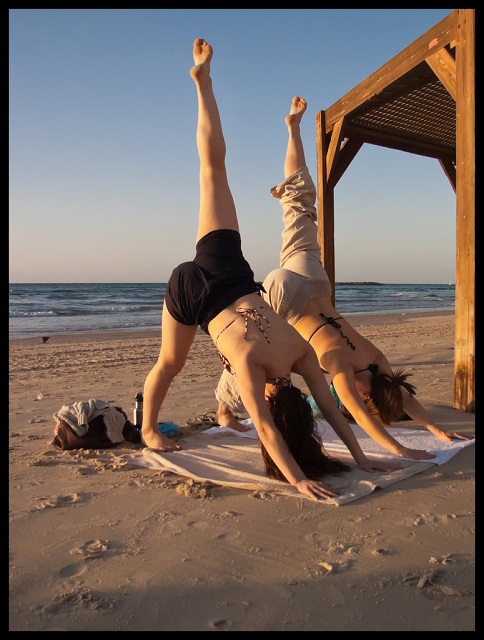
~
This article is in direct response to (and in support of) a recent blog post entitled: “The Shadows of Yoga & Spirituality: I was raped by my Yoga teacher in India.”
~
Sometimes, when I think about the culture that we have created around yoga, I feel angry.
This was not always the feeling I associated with the sweet communities that have taught me so much, but when these communities begin to perpetuate and silence violence against women, I feel angry, and deeply disappointed.
Unfortunately, when I read the story of a brave woman’s sexual assault within one of my most shining yoga communities, I was not surprised. I felt sick and saddened, damaged, driven to stand in solidarity, and to open my eyes to the darker side of guru culture.
This is a culture that allows men to enter the community and almost immediately rise to the top, despite the fact that the majority of participants are strong, radiant women, capable of leadership. We call this the glass escalator, a trend that can also be seen amongst school teachers, nurses, and many other women-dominated industries.
These predominantly female populated environments highly value men and promote them at a more rapid rate than their female counterparts. From these examples, we see that this is a systemic problem and an overt reminder that yoga, like the rest of the world, needs feminism.
The problem is not just that men’s presence is more highly valued in our yoga culture, as I’ve observed, but the dangerous power dynamic that evolves out of this setup. People come to yoga for healing, not just physically, but also emotionally and spiritually.
We expose ourselves to great levels of vulnerability when we open up to the practice of yoga. These trusted “gurus” adopt positions of power, often receiving devotion, amidst the vulnerability of budding yogis. For these reasons the interpersonal exchange is extremely fragile, but also holds the power for tremendous growth. Leaders in these positions must be prepared to hold a safe space, to be grounded and to set appropriate boundaries.
As yoga teachers and healers, we bear the responsibility of holding a sacred and safe space. People come to yoga to build strength of body and mind, not to become overpowered and then disempowered, as is the case with sexual assault.
When a member of the community is hurt, we find collective strength in unity; we come together. We speak louder, we talk more—we work it out, because this serves the entire group. What disperses the group is when we go quiet, when we start to whisper, growing in our own fear, sinking into ourselves, and pushing away those who have been hurt.
Our collective silence is compliance—it is violence. What has happened to the meaning of ahimsa (non-violence,) the lessons of moral conduct that we learned so diligently in the same space where misconduct was being overlooked? What about the principle of satya (truth) and the implications of karma (the sum of our actions)?
I think back to the times I’d inquired amongst the other team members about strange interactions—it wasn’t coming from a place of gossip—but a place of intuition, a seeking of safety. It was as if we were striving for communal exchange and collective processing to ease the tension of knowing that something was not right. Subconsciously, I wanted to return to balance, where everyone was protected.
By not talking about it, no one felt entirely secure, but somehow, the risk of losing job security felt worse. Is a paycheck worth more than preventing the manifestation of a lifetime of trauma? A woman’s right to her body is far greater than a job. Admitting this error does not diminish your career, but deepens your humanity. This is bigger than all of us, which is exactly why we need to join together and say “enough.”
Feminism is about inclusivity. It is about building a supportive community and honoring each individual for their divine gifts—it is not about shaming and blaming the bravery of one who has spoken out and spoken up. We must not invalidate someone else’s trauma just to avoid inconvenient circumstances. Even when we allow ourselves to look away, there is still a sound, there is still suffering, deep-seated trauma, repercussions.
This is not just a call to the Yoga Alliance; this is a pleading invitation to reevaluate our own standards. It is a call to hold our spiritual communities accountable, even when it is not convenient. I invite you to step out of the madness and to step into integrity—to free yourself from the insecurity, and once again, to embrace the yogic principle of ahimsa. Don’t you see? This is more than you and I; it is a cycle of systemic oppression. It is a cycle that is derived from silencing those who are in some way less powerful.
By remaining inactive, not only do we disempower the victim, but we disempower ourselves. As members of this shared community, we need to remind each other not to comply with violence. By standing up to each other—we stand up for each other. Collectively we have the power to be heard and to save each other.
Disempowering the perpetrator does not disempower our experience in the community. It does not invalidate the connections we’ve made or the immense personal growth we’ve encountered in this space. What may however, de-value our experience, is the reflection of each time that something didn’t feel right and we let it go—of every time you diminished your divine and powerfully honest intuition for the sake of your job, or for the sake of a man.
I am sorry for not speaking up sooner, for not speaking more loudly when we all knew something wasn’t right. I am sorry for assuming that to dismantle this dangerous culture, was to dismantle my experience—maybe it was. And maybe that’s a good thing.
I did not want to admit that the foundation of my program was embedded within a power imbalance. This individual’s actions did not impact the quality of experience or education that I received at the school. I was not directly affected or harmed by this individual, and many of us weren’t, but that does not devalue the experience of those who were.
I honor the home that this community provided for me, the teachers and the students that thrived despite the lack of ethical leadership. This is the place where I have met some of the best people in the world. I would never take that back, but I ask that we move forward in solidarity, in gratitude for each other, holding space for those who have suffered.
The collective energy of these radiant souls contributed to my experience, not one “guru” lacking boundaries. While the guru lays the foundation for something beautiful, his ego must be able to withstand this pressure; if not, there is the potential for harm.
I am not here to taint the gifts of this wonderful school, but to emphasize one individual’s misuse of power and bring awareness to those who have lost their voices in this shadow. Yoga needs feminism as a mechanism for deep communication, fierce protection, and gentle nurturing for all those who embark on the journey.
~
Author: Molly McConnell
Image: Flavio/Flickr
Editor: Lieselle Davidson











Read 1 comment and reply